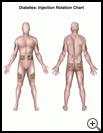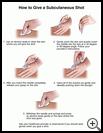
Diabetes Complications
What is diabetes?
Having diabetes means that there is too much sugar (glucose) in your blood. When you eat food, your body breaks down much of the food into glucose. Your blood carries the glucose to the cells of your body. An organ in your upper belly called the pancreas makes and releases a hormone called insulin when it detects glucose. Your body uses insulin to help move the glucose from the bloodstream into the cells for energy. When your body does not make insulin (type 1 diabetes), or has trouble using insulin (type 2 diabetes), glucose cannot get into your cells. The glucose level in your blood goes up. Too much glucose in your blood (also called hyperglycemia or high blood sugar) can cause many problems. Diabetes complications can include:
- Frequent infections
- Slow healing wounds
- Slow emptying of the stomach (gastroparesis)
- Sexual problems
- Nerve damage (neuropathy) that causes numbness or tingling in hands or feet
- Heart disease
- Stroke
- Blindness
- Amputations
- Kidney failure
- Coma or death
What can I expect in the hospital?
You may need to stay in the hospital because you need more treatment for your diabetes complication than you can safely receive at home. This may include treating very high or very low blood glucose.
Several things may be done while you are in the hospital to monitor, test, and treat your condition. They include:
Monitoring
- You will be checked often by the hospital staff.
- Your blood glucose will be checked regularly. This may be done as often as every hour.
- A heart (cardiac) monitor may be used to keep track of your heartbeat.
- Your blood oxygen level may be monitored by a sensor that is attached to your finger or earlobe.
- Your fluid intake will be monitored closely by keeping track of everything you eat and drink and any IV fluids you receive.
- You may have a small tube (catheter) placed into your bladder to drain and measure urine.
Testing
Testing may include:
- Blood tests (Hemoglobin A1C) to check your average blood glucose over the past 3 months. Hemoglobin A1C is also known as HbA1C and A1C.
- Blood or urine tests to check for infections
- Blood tests to check to see if your body is making insulin
- Blood, urine, or other tests to monitor how well your organs are functioning
- Arterial blood gas (ABG), which is a blood test that measures the levels of oxygen and carbon dioxide in your blood. It also measures the balance of acids and bases in your blood (called the pH)
- X-rays, which use energy called radiation to make of pictures of your bones, tissues, and organs to check for infection
Treatment
The treatment for diabetes mellitus and its complications depends on the type of diabetes and the complications that you have, as well as how well your blood glucose is controlled with treatment. The goal is for you to keep your blood glucose level in a normal range to prevent other complications. Treatment may include:
- You will have a small tube (IV catheter) inserted into a vein in your hand or arm. This will allow medicine to be given directly into your blood and to give you fluids, if needed.
- Your provider may prescribe medicines to:
- Control your blood glucose
- Treat other medical problems that may have been caused by or made worse by diabetes
- Treat pain
- Treat or prevent an infection
- Treat or prevent side effects, such as nausea or constipation, from other treatments
- Your provider may recommend other types of therapy to help relieve pain, other symptoms, or side effects of treatment.
- Ask your healthcare provider about the symptoms and causes of low blood glucose and what to do when you have low blood glucose. Carry some form of sugar at all times, so you can treat low blood glucose quickly.
- You may need surgery to treat complications of diabetes. This may include surgery to:
- Remove infected tissue that will not heal. This may include amputation of an infected body part.
- Treat gastroparesis by inserting a feeding tube or removing a blockage.
- Reduce leaking from blood vessels in the eyes. The surgeon may also use a laser to help reduce the growth of abnormal blood vessels or to clear bleeding into the eye.
- Treat sexual dysfunction in men by implanting a penile device to allow erections.
- You may need physical therapy treatments if you have an infection or have had surgery. Physical therapy may include exercises for weak muscles, and use of splints or special shoes.
- You may need kidney dialysis to help filter your blood if your kidneys are not working properly.
What can I do to help?
- You will need to tell your healthcare team if you have new or worsening:
- Fainting
- Seizures
- Increased urination or trouble emptying the bladder
- Increased thirst and dry mouth
- Increased appetite or loss of appetite
- Fast or irregular heartbeat
- Fruity odor to breath
- Change in vision, such as double vision, blurred vision, or trouble seeing out of one or both eyes
- Floaters, which are black spots or cobweb-like shapes in your vision
- Numbness in your feet or hands
- Redness, bumps, blisters, or sores on your skin
- If you had surgery:
- Redness, swelling, pain, warmth, or drainage from your surgical wound
- Fever, chills, or muscle aches
- Ask questions about any medicine, treatment, or information that you do not understand.
How long will I be in the hospital?
How long you stay in the hospital depends on many things, such as your general health, why you are in the hospital, and the treatment you need. Talk with your provider about how long your stay may be.
Last modified: 2016-02-18
Last reviewed: 2016-02-12


